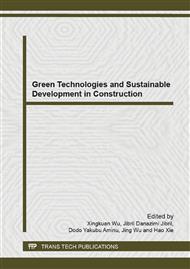p.265
p.273
p.277
p.281
p.285
p.289
p.293
p.297
p.302
Low Carbon City Planning Method Based on Value Engineering Theory
Abstract:
Exploration of low carbon city planning is the key to achieve sustainable development, which also has important meaning for the construction of energy-saving society. The value engineering theory was introduced into low carbon urban planning in this work, with the analysis method of three steps proposed. Firstly, sort out the planning index system and determine the key parameters. Secondly, quantify the value coefficient of each parameter by the expert scoring method. Lastly, get the highest priority value coefficient to achieve the purpose of carbon effect with lowest cost. Through illustrating the principle of the method by an example, the actual meaning of low carbon city planning using value engineering theory was proved effective.
Info:
Periodical:
Pages:
285-288
DOI:
Citation:
Online since:
May 2014
Authors:
Keywords:
Price:
Сopyright:
© 2014 Trans Tech Publications Ltd. All Rights Reserved
Share:
Citation:


